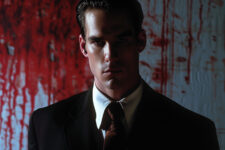
To be, or not to be, that is the question:
Whether ’tis nobler in the mind to suffer
The slings and arrows of outrageous fortune,
Or to take arms against a sea of troubles
And by opposing end them. To die—to sleep,
No more; and by a sleep to say we end
The heart-ache and the thousand natural shocks
That flesh is heir to: ’tis a consummation
Devoutly to be wish’d. To die, to sleep;
To sleep, perchance to dream—ay, there’s the rub:
For in that sleep of death what dreams may come,
When we have shuffled off this mortal coil,
Must give us pause—there’s the respect
That makes calamity of so long life.
For who would bear the whips and scorns of time,
Th’oppressor’s wrong, the proud man’s contumely,
The pangs of dispriz’d love, the law’s delay,
The insolence of office, and the spurns
That patient merit of th’unworthy takes,
When he himself might his quietus make
With a bare bodkin? Who would fardels bear,
To grunt and sweat under a weary life,
But that the dread of something after death,
The undiscovere’d country, from whose bourn
No traveller returns, puzzles the will,
And makes us rather bear those ills we have
Than fly to others that we know not of?
Thus conscience doth make cowards of us all,
And thus the native hue of resolution
Is sicklied o’er with the pale cast of thought,
And enterprises of great pith and moment
With this regard their currents turn awry
And lose the name of action.
― William Shakespeare, Hamlet
This famous soliloquy is spoken by Hamlet in Act III, Scene I of William Shakespeare’s play “Hamlet.” At this point in the play, Hamlet is grappling with his father’s death and his mother’s hasty remarriage to his uncle, Claudius. He suspects that Claudius murdered his father, and he is torn between his desire for revenge and his uncertainty about the morality of his actions.
The soliloquy begins with the famous line, “To be, or not to be,” which encapsulates Hamlet’s dilemma: whether to continue living and face the challenges and pain of life, or to end his life and escape his suffering. He ponders whether it is nobler to endure the hardships of life (“the slings and arrows of outrageous fortune”) or to take action against his troubles, even if that means ending his own life.
Hamlet then reflects on the nature of death, comparing it to sleep. He wonders if death could provide a release from the pain and heartache of life, describing it as a “consummation devoutly to be wish’d.” However, he also acknowledges the uncertainty of what lies beyond death, “the undiscover’d country,” and the fear of the unknown that keeps people from taking their own lives.
He lists the many sufferings of life, including oppression, insults, unrequited love, legal injustice, and the abuse of power. Hamlet questions why anyone would choose to bear these burdens when they could easily end their life with a “bare bodkin” (a dagger). However, he recognizes that the fear of the afterlife and the uncertainty of what awaits us after death is what makes people endure the hardships of life.
In the end, Hamlet concludes that the contemplation of death and the unknown makes people cowardly, causing them to lose their resolve and fail to take decisive action. The “pale cast of thought” (over-thinking) saps the strength of even the most determined plans and turns them away from their intended course.
This soliloquy is a powerful exploration of the human condition, the nature of life and death, and the psychological factors that influence our actions. It showcases Hamlet’s philosophical depth and his struggle with the complexities of existence, a theme that resonates with audiences across time and cultures.






